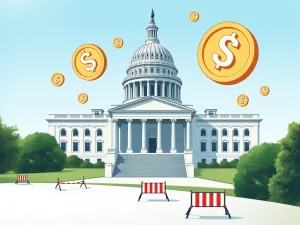Digital Asset Taxes: US Senators Issue Urgent Call for Change

The landscape of US corporate taxation for digital assets could be facing significant changes. Two prominent US Senators are pushing the Treasury Department to modify rules they argue put domestic companies at a disadvantage globally. This move directly addresses concerns around digital asset taxes and aims to provide relief to businesses holding cryptocurrencies and other digital assets.
Why Are US Senators Concerned About Digital Asset Taxes?
Senators Cynthia Lummis and Bernie Moreno have formally requested Treasury Secretary Scott Bessent to quickly address a specific definition within existing law that impacts how US companies are taxed on their digital asset holdings. Their primary concern is that the current framework, particularly as influenced by recent legislation, could tax US companies more heavily than their foreign competitors, potentially harming the nation’s standing in the evolving digital finance space.
Key points highlighted by the senators include:
- The need for the Treasury Department to exercise its authority to redefine “adjusted financial statement income.”
- This redefinition is proposed as a way to modify a provision introduced by the Inflation Reduction Act of 2022.
- The goal is to provide “relief to corporations that invest in digital assets.”
- Failure to act could jeopardize the US edge in digital finance.
Understanding the Impact on US Corporate Taxes
The core issue stems from the Inflation Reduction Act, which took effect in 2023. This law introduced a 15% minimum tax for large corporations reporting over $1 billion in profits over three consecutive years. The concern is that this measure might inadvertently include unrealized gains and losses from digital asset holdings when calculating a company’s taxable income, leading to unexpected or excessive tax burdens.
This potential taxation of unrealized gains is a significant point of contention for companies dealing in digital assets. Senators Lummis and Moreno argue that changing the definition used for tax calculations is crucial to prevent this outcome and ensure a more favorable environment for digital asset investment within the US.
How Does the Inflation Reduction Act Connect to Crypto Taxes?
The link between the Inflation Reduction Act and crypto taxes lies in how corporate income is defined for the minimum tax calculation. If the definition of “adjusted financial statement income” includes unrealized fluctuations in the value of digital assets held by a corporation, it could trigger significant tax liabilities even if those assets haven’t been sold. The senators believe the Treasury has the power to clarify or change this definition to exclude such unrealized gains/losses from the calculation, thereby easing the tax burden on companies with digital asset exposure.
Beyond Digital Asset Taxes: Other Actions by US Senators
This push for tax clarity on digital assets comes as US Senators are also grappling with other aspects of cryptocurrency regulation. The article mentions the Senate is expected to consider another vote on the GENIUS Act, which aims to regulate payment stablecoins. While distinct from the tax issue, both demonstrate ongoing efforts within the Senate to establish clearer rules and frameworks for the digital asset industry in the United States.
Senator Lummis, a vocal advocate for digital assets, is a co-sponsor of the stablecoin bill and continues to support thoughtful regulation in the space. The political landscape around crypto remains dynamic, with significant industry support influencing key races, as seen with Senator Moreno’s election.
Summary: The Critical Need for Clarity on Digital Asset Taxes
The call from Senators Lummis and Moreno highlights a critical point for the US digital asset industry: the need for clear, fair, and competitive tax rules. By urging the Treasury to modify the definition impacting corporate digital asset taxes under the Inflation Reduction Act, they aim to prevent US companies from being disadvantaged and ensure the nation remains a leader in digital finance. The outcome of this request and ongoing regulatory efforts will significantly shape the future for businesses operating with digital assets in the United States.









